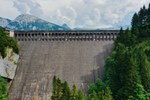News
Point of view: The Alps are not an endless source of energy!

I’m optimistic about the future – Alpine and non-Alpine ski destinations are being turned into sustainable alternatives for balanced year-round tourism, existing infrastructure is being fitted with photovoltaic systems, outdated oil-fired heating systems in mountain villages are being replaced with heat pumps, while Alpine landscapes continue to be a refuge for rare and endangered gems of biodiversity. But the latter in particular are now increasingly in danger: the climate crisis and rising energy costs can only be averted by a rapid and effective energy turnaround. Remaining natural resources in the Alpine regions are now having to give way for the expansion of installations for producing renewable energy, however. Is this really necessary? The Alpine region and its resources are not infinite – and we must also bear this in mind when it comes to the energy turnaround!
It is scientifically proven that an energy transition is needed, away from fossil fuels and towards renewable energy production, so as to achieve the goals of the Paris Climate Agreement. In the Alpine region and beyond, the penny has finally dropped that we need to push ahead with the expansion of renewable energy from solar, wind or hydropower. The will exists on virtually all sides of the political divide to promote renewable energies in order to bring the climate crisis to an end. But it probably cannot be said often enough: we must avert both the climate and the biodiversity crisis. This is precisely what the energy transition must not overlook. New reservoirs are flooding pristine glacier forelands, while areas of Alpine biodiversity are having to make way for large solar parks. Hardly anyone is in favour of the destruction of valuable natural and cultural areas and, moreover, international agreements oblige us to care for and protect natural diversity. Whether the emergency decree on the approval of renewables issued by the EU at the end of 2022, the consolidation legislation on the Energy Act being discussed in the Swiss parliament, or other Alpine deregulation projects are in conflict with the Alpine Convention from a legal point of view, are all currently being clarified following a request submitted by CIPRA.
There exist biodiversity-friendly solutions for the expansion of renewable energy: the Alpine region holds great potential in terms of already sealed and built-up areas in ski resorts and industrial facilities. In this way, energy could be produced where it is also consumed. What about using the available energy more efficiently and rethinking our consumption behaviour? My optimistic vision of the future also includes a society that values time availability over material wealth, relies on truly sustainable energy production, and accords nature the value it deserves.
Sources and further information:
www.wsl.ch/de/newsseiten/2022/12/schweizer-bevoelkerung-will-keine-energieanlagen-in-unberuehrten-alpenlandschaften.html (de), www.cbd.int/doc/decisions/cop-15/cop-15-dec-04-en.pdf; www.alpconv.org/de/startseite/konvention/rahmenkonvention/ (de)




